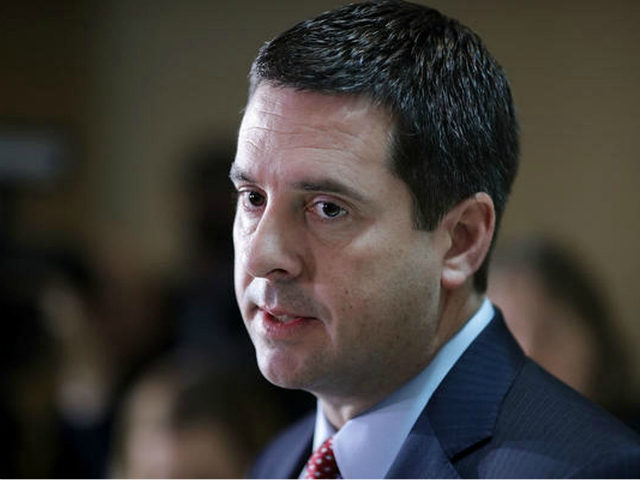House Intelligence Committee Chairman Devin Nunes (R-CA) is demanding that the Justice Department hand over an unredacted version of the document it used to launch the Trump-Russia probe in July 2016.
In a letter to Deputy Attorney General Rod Rosenstein and FBI Director Christopher Wray on Wednesday, Nunes directed them to give the document, known as an electronic communication or EC, and other requested documents by next Wednesday.
He also threatened legal action: “Be advised that failure to comply in a satisfactory manner will result in the Committee pursuing all appropriate legal remedies, including seeking civil enforcement of the August 24 subpoenas in federal district court.”
Nunes, in seeking to find out exactly what sparked the FBI’s investigation into the Trump campaign and the extent the infamous Clinton-funded dossier played a role, has sought the EC from the FBI since last August.
He subpoenaed for the EC on August 24, 2017. He said the committee was given a heavily redacted form. On February 27, 2018, Nunes requested Wray’s assistance in obtaining the EC. On March 14, 2018, the committee was given access to a still heavily redacted version.
Nunes said he called Wray the next day to tell him it was unsatisfactory. On March 23, 2018, the FBI’s Assistant Director for Legislative Affairs Gregory Brower informed the committee the FBI was refusing to redact the document, based on its supposed sensitivity.
Nunes rejected that argument in his letter, published by Fox News.
The document in question is not highly classified, and law enforcement sources have apparently not been shy about leaking to the press information that the Department and Bureau refuse to share with Congress.
Brower was appointed to his position by then-FBI Director James Comey. He began working at the FBI in 2016 and previously had served as deputy general counsel in the Office of the General Counsel, according to his web bio.
While the unredacted EC has been kept from Nunes, “current and former” officials leaked to the New York Times about what allegedly started the Trump-Russia investigation.
The December 30 Times story said information about George Papadopoulos, a former Trump campaign volunteer, sparked the investigation — not the dossier.
“The information that Mr. Papadopoulos gave to the Australians answers one of the lingering mysteries of the past year: What so alarmed American officials to provoke the FBI to open a counterintelligence investigation into the Trump campaign months before the presidential election?” the Times reported.
“It was not, as Mr. Trump and other politicians have alleged, a dossier compiled by a former British spy hired by a rival campaign. Instead, it was firsthand information from one of America’s closest intelligence allies.”
Nunes has also demanded the FBI provide wider access to the four applications used to obtain the surveillance warrant on Trump campaign volunteer Carter Page.
Only one member from the majority and minority on the committee were allowed to review those applications, but Nunes said his initial designation of Rep. Trey Gowdy (R-SC), a former federal prosecutor, to view the documents did not limit or waive the authority of other committee members from viewing them.
Nunes sent a request to view the documents on February 7, and again on February 8, February 14, and February 26. Brower finally told the committee on February 26, 2018, that the “Department has not agreed to allow further member access.”
Nunes wrote: “This arbitrary resistance to legitimate oversight is unacceptable.”
“Thereby, in accordance with the August 24, 2017 subpoenas, you are hereby directed to produce to the Committee, by Wednesday, April 11, 2018, an unredacted version of the EC, along with any and all responsive documents previously made available for in camera review, including but not limited to the Carter Page FISA applications,” he wrote.
2018_04_04_12_39_29 by Fox News on Scribd

COMMENTS
Please let us know if you're having issues with commenting.